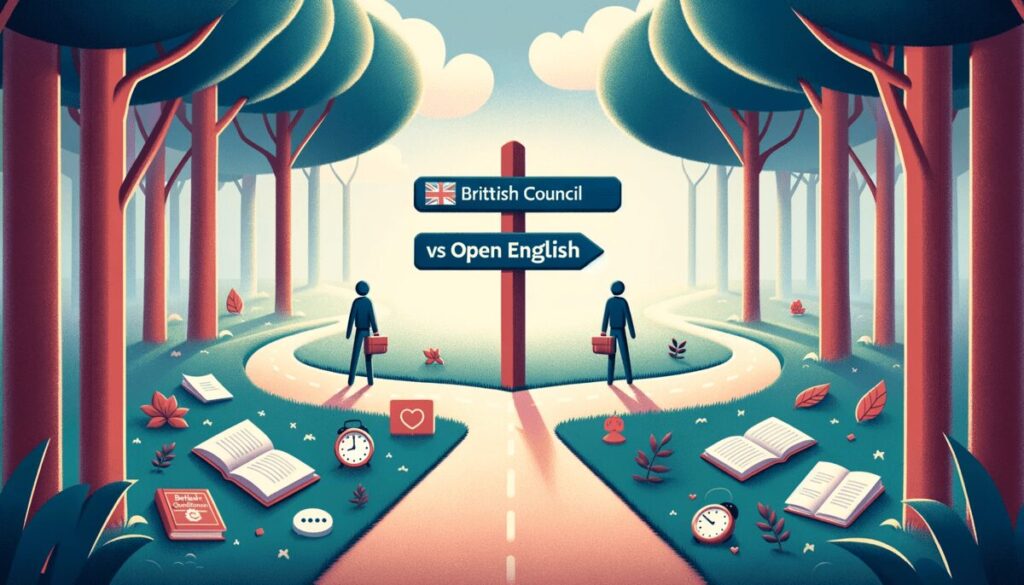Explore the British Council vs Open English comparison to choose the best online English course. We analyze methodology, flexibility, teaching and more, giving you the keys to an informed decision.
Table of Contents
Evaluation of language platforms
In an increasingly interconnected world, English has established itself as the universal language in the professional, educational and cultural fields. This reality has driven millions to seek effective and convenient methods to improve their language skills. Online English courses, such as those offered by the British Council and Open English, represent a modern solution that combines flexibility, accessibility and educational quality. While both services promise to improve your language proficiency, it's important to consider their unique approaches and what sets them apart. This article delves into a detailed comparison between the British Council and Open English, highlighting the strengths and features of each, with a special focus on how British Council courses are designed to offer exceptional value to its students.
What are the British Council and Open English?
The British Council is an internationally renowned institution, founded in 1934 with a mission to foster cultural and educational understanding between the UK and the world. With more than 80 years of experience teaching English, she has developed a pedagogical approach that emphasizes not only language learning but also cultural understanding. Her courses are designed under strict quality standards and are taught by highly qualified professionals, ensuring that students not only learn English, but also gain a global perspective.
On the other hand, Open English was founded in 2007 with the aim of providing a more flexible and accessible English learning method for people in Latin America and later, in other markets. The platform stands out for its live classes available 24/7, allowing students to learn at their own pace and on their own schedule. Its practical and direct approach is designed to cater to those looking to quickly improve their English skills, focusing on conversation and practical understanding of the language.
Maximize your learning: Annual Coursera Plus with a $100 discount, for a limited time only. Click and start now!
While the British Council is proud of its rich heritage and holistic approach to teaching English, Open English offers a modern and flexible solution tailored to the needs of today's students. Both platforms provide valuable avenues for learning English, but with different approaches that can appeal to different types of students depending on their objectives, learning styles and needs.
Learning methodology and course contents
The learning methodology is a crucial aspect that differentiates the British Council from Open English. The British Council takes a structured and holistic approach to learning English. It uses a pedagogical framework based on the Common European Framework of Reference for Languages (CEFR), ensuring that all levels of learning are well defined and internationally consistent. Students are encouraged to participate in a variety of interactive activities and real-life situations that improve all language skills: speaking, listening, reading and writing. In addition, the British Council offers a diverse range of specialist content, from English for work, preparation for exams such as IELTS, to English for travel and leisure, covering a wide range of needs and interests.
Open English, for its part, places a particular emphasis on flexibility and language immersion. With live classes available 24 hours a day, students can interact in real time with native speakers and other students from around the world. This constant exposure to the language facilitates more natural and fluid learning, especially in comprehension and conversation. Additionally, the platform offers a variety of interactive and hands-on lessons that can be customized based on the student's areas of interest and skill level. Although less structured than the British Council, Open English provides a flexible and practical route to learning English, especially for those with irregular schedules or immediate learning needs.
British Council offers a complete and structured learning experience with a wide variety of content, Open English focuses on providing flexibility and immediate language practice. Each approach has merit, and choosing between one or the other will depend on the personal preferences, learning goals, and lifestyles of the students.
Flexibility and access
Flexibility and access are key aspects for many students when choosing an online English course. This is where both the British Council and Open English offer attractive but different proposals.
The British Council stands out for its flexible and personalized approach. Students can choose from a wide range of class times and types, including individual and group options. This allows students to fit their learning around their personal and professional schedules, a significant advantage for those with varying commitments. Additionally, access to learning materials is broad and diverse, with resources available online to practice at any time. This combination of scheduled classes and self-study resources ensures that students can maintain consistent progress at their own pace.
Open English, on the other hand, is known for its 24/7 accessibility. Live classes are available at any time, which is ideal for students with unpredictable schedules or those who prefer to study at unconventional hours. The platform also offers a variety of interactive tools and recorded lessons that students can use to practice and improve their skills at any time. This constant availability makes Open English an excellent option for people looking to integrate English learning flexibly into their daily lives.
British Council offers a customizable structure with a mix of live classes and self-study resources. Meanwhile, Open English provides exceptional flexibility with uninterrupted access to live classes and materials. The decision between one or the other will largely depend on how students prefer to organize their learning time and what level of structure they are looking for in their educational program.
Experience and qualification of teachers
The quality of teaching is crucial in any language course, and teachers play a fundamental role in this aspect. Both the British Council and Open English pride themselves on highly qualified teaching teams, but their approaches and requirements vary.
Take advantage: Annual Coursera Plus with $100 discount. USD $299 for a limited time! Click and find out how.
The British Council is known for its rigorous teacher selection and training process. All instructors must meet high academic standards and have recognized certifications, such as CELTA or DELTA. Additionally, many have years of experience teaching in different cultural contexts, further enriching their teaching with a deep understanding of students' varied linguistic and cultural needs. The British Council's commitment to quality teaching is reflected in the satisfaction and success of its students, who often highlight the competence and dedication of their teachers.
Open English also highlights the quality of its teachers, who must be native English speakers and have teaching experience. The platform is known for its interactive and dynamic approach, and teachers are trained to keep online classes engaging and effective, using technology and interactive resources. Although the requirements may be less strict than those of the British Council, Open English ensures that all its teachers are qualified and prepared to provide a quality education.
What can be concluded is that, while the British Council focuses on the high qualification and international experience of its teachers, Open English places emphasis on interactivity and dynamism in teaching. Both approaches ensure that students receive quality instruction, although methods and experience may vary.
Certification and recognition
The certification obtained upon completion of an English course is not only proof of achievement, but also a valuable instrument in continuing education and professional development. Both the British Council and Open English offer certificates upon completion of their courses, but the weight and recognition of these can vary significantly.
The British Council enjoys global prestige and is widely recognized in the educational field and professional. Its courses are aligned with the Common European Framework of Reference for Languages (CEFR), and the certificates issued reflect this international standard. This means that British Council certifications are accepted and respected by universities, employers and professional organizations around the world. In addition, the British Council offers specific preparation for exams such as IELTS, a requirement for admission to many educational institutions and an indicator of English proficiency in several countries.
Open English, for its part, also offers certificates at the end of its courses. These certificates can be useful to demonstrate commitment and progress in learning the language, especially in professional or personal contexts. However, it is important to verify the extent to which these certificates are recognized in the student's specific academic or professional field, as they may not have the same weight as those issued by institutions with a long history and global recognition such as the British Council.
While British Council certification is widely recognized and respected around the world, providing a clear benefit in terms of academic and professional opportunities, Open English certification may be more suitable for personal objectives or less formal professional contexts. Students should consider their specific goals and needs when evaluating the importance of recognition and validity of these certifications.
Costs and plan options
An important consideration for many students when choosing an online English course is the cost and plan options available. Both the British Council and Open English offer a variety of plans to suit different budgets and learning needs, but there are notable differences in their pricing structures and what each offers.
The British Council offers a range of course options varying in length, intensity and focus. The prices of its courses reflect the quality and prestige of the institution, as well as the experience and qualifications of its teachers. Although it may be more expensive than other options, many students find the investment worth it due to the high quality of teaching and the global recognition of their certifications. Additionally, the British Council often offers specialized packages and discounts on certain courses, which can make their programs more accessible.
Open English positions itself as a more affordable option, with flexible plans designed to fit a variety of budgets. The platform typically offers monthly, quarterly, and annual subscriptions, with prices decreasing as the length of the commitment increases. Although it may be cheaper, it is important for students to consider how effective the classes and materials are based on their learning objectives and whether the cost represents good value in the long term.
In essence, while the British Council may represent a higher initial investment, its reputation and quality of teaching may justify the cost for those seeking deep, recognized learning of English. Open English, on the other hand, may be a more suitable option for those on a tighter budget or looking for a more flexible, short-term solution. Students should carefully evaluate their needs and resources when deciding which platform and pricing plan best suits their circumstances.
Testimonials and success stories
Testimonials and success stories are a valuable way to understand the real impact of an online English course. The experiences shared by previous students can offer a unique perspective on the effectiveness, challenges and benefits of British Council and Open English programmes.
The British Council, with its long history in teaching English, has numerous testimonies from students around the world. These testimonials often highlight the quality of teaching, the improvement in language skills, and the value of the certifications earned. Students often mention how the courses have positively impacted their academic, professional and personal opportunities, providing anecdotes about the use of English in international contexts, improvements in their careers and success on proficiency exams. These stories underline the British Council's reputation as an institution that not only teaches English, but also opens doors to new opportunities.
Open English, for its part, has compiled a number of success stories from students who have seen significant improvements in their English proficiency. Testimonials often focus on the flexibility and convenience of classes, as well as the effectiveness of a more interactive and hands-on approach. Students often highlight the convenience of having access to teachers at any time and the advantage of being able to practice with native speakers regularly. These stories reflect how Open English can be an effective solution for those looking to improve their English in a flexible and dynamic way.
Both the British Council and Open English have compelling success stories and testimonials to support their methods and results. Potential students would do well to consider these stories when making their decision, as they offer a window into the type of experience and results they could expect from each platform.
British Council vs Open English: a projection decision
This article has provided a detailed comparison between two leading online English course providers: the British Council and Open English. We have explored various aspects, including learning methodology, flexibility and access, teacher experience and qualifications, certification and recognition, costs and plan options, as well as testimonials and success stories.
The British Council stands out for its structured and holistic approach, the high qualification of its teachers, the global recognition of its certifications and the variety of specialized content it offers. It is an excellent option for those who seek quality education with an international perspective and are willing to invest in deep and widely recognized learning.
Open English, on the other hand, provides a flexible and dynamic solution, ideal for students with unpredictable schedules or those who prefer a more interactive and hands-on approach. Its 24/7 access and the immersive nature of its classes make it attractive to those looking to improve their English quickly and conveniently.
When deciding between the British Council and Open English, students should consider their personal and professional goals, their preferred learning style, and the type of investment they are willing to make in their education. Both providers offer valuable pathways to English proficiency, but the added value of British Council courses in terms of quality, recognition and depth of learning is evident.
Ultimately, success in learning English depends on the student's commitment and choosing a course that aligns with their needs and aspirations. We hope this analysis has provided clear insight to help you make an informed and successful decision on your journey towards English fluency.
At the end of this comparative analysis between British Council vs Open English, it is clear that both offer valuable paths to English proficiency, each with their unique advantages. While the British Council provides in-depth, globally recognized education, Open English offers flexibility and accessibility for those with dynamic lifestyles. The choice will depend on your personal preferences, goals, and the type of investment you are willing to make in your education. No matter which one you choose, commitment and dedication will be key to your success in learning the language.












